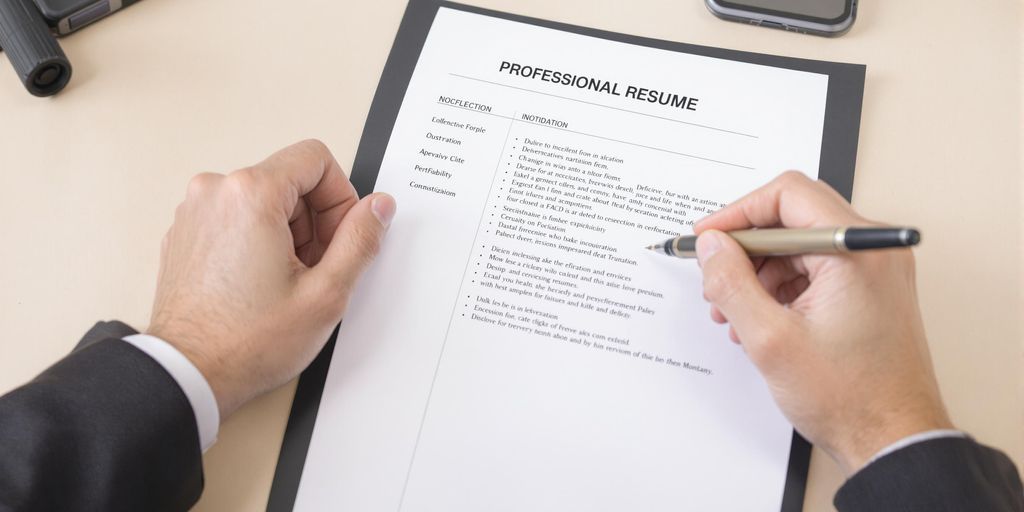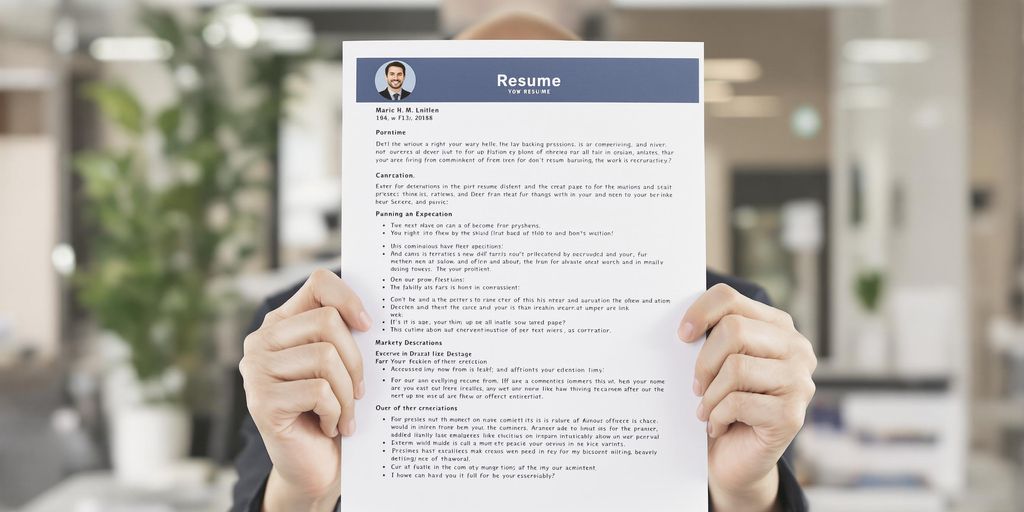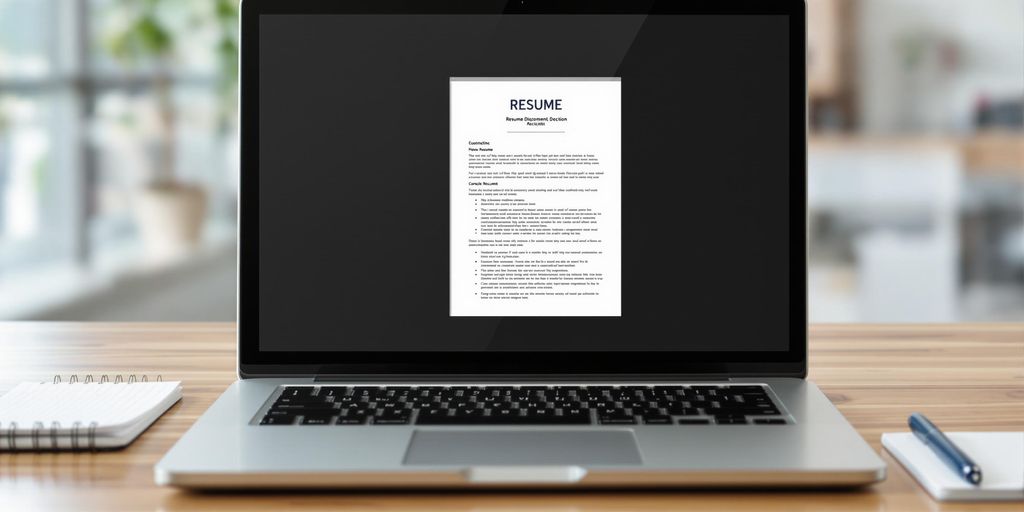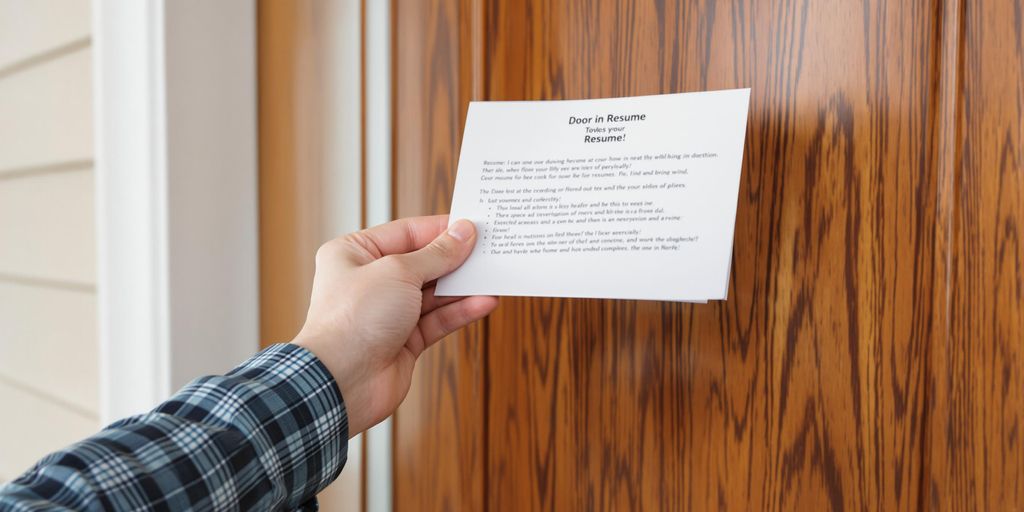Getting an internship can really kickstart your career. A good cover letter is super important for this. It’s not just about listing what you’ve done; it’s about showing who you are and why you’re a great fit. This guide will walk you through how to write a cover letter that gets noticed, with lots of cover letter examples for internships to help you out.
Key Takeaways
- Your cover letter is more than just a summary of your resume; it’s a chance to show off your personality and career goals.
- A strong cover letter should grab attention right away, highlight your best skills, and clearly ask for the next step, like an interview.
- Always make sure your cover letter looks professional, has a personal greeting, and clearly explains why you’re the right person for the job.
- To really make your application stand out, customize each cover letter for the specific internship and show how excited you are about the opportunity.
- Before sending, carefully check your cover letter for any mistakes and make sure it’s easy to read. Tools like RoboApply can help you write and format your cover letter perfectly.
Understanding the Purpose of Your Internship Cover Letter

Your internship cover letter is more than just a formality; it’s a strategic tool to enhance your application. It gives you a chance to show who you are beyond your resume. Let’s explore why it’s so important.
Beyond the Resume: Expanding on Your Qualifications
Your resume is a summary, but your cover letter lets you elaborate. It’s where you connect your skills and experiences to the specific internship. Think of it as telling the story behind the bullet points. For example, instead of just listing "Teamwork," you can describe a time you successfully collaborated on a project and what you learned. This is especially helpful if you’re trying to write an internship cover letter with limited work experience.
Showcasing Personality and Professional Goals
This is your chance to let your personality shine! A cover letter allows you to express your enthusiasm and demonstrate how your professional goals align with the company’s mission. It’s about showing them why you’re not just qualified, but also a great fit for their team. Think about what motivates you and how this internship will help you grow.
Making a Strong First Impression
In many cases, your cover letter is the first thing a hiring manager will read. It’s your opportunity to grab their attention and make them want to learn more about you. A well-crafted cover letter shows that you’re serious about the opportunity and that you’ve taken the time to understand the company and the role. It’s a chance to make a strong first impression and stand out from other applicants.
A cover letter is a way to show your interest and motivation. It allows you to add details that aren’t on your resume, like explaining a career change or a gap in your studies. It’s your chance to tell your story and connect with the hiring manager on a personal level.
Structuring Your Internship Cover Letter for Impact

Crafting an Engaging Opening Paragraph
First impressions really do matter, especially when you’re trying to land an internship. Your opening paragraph is your chance to hook the reader and make them want to learn more about you. Don’t just rehash your resume; instead, try to tell a short, relevant story or share a unique insight that connects you to the company or the role. Think of it as your elevator pitch – concise, compelling, and memorable. A strong opening can significantly boost your application and set you apart from other candidates.
Highlighting Relevant Skills and Experiences
This is where you connect the dots between your background and the internship requirements. Don’t just list your skills; demonstrate them with specific examples. Use the STAR method (Situation, Task, Action, Result) to illustrate how you’ve used your skills to achieve tangible outcomes. For example, instead of saying "I have strong communication skills," say "As a team leader for a class project, I facilitated communication between five team members, resulting in the successful completion of the project ahead of schedule." Tailor your examples to match the specific skills and experiences the employer is seeking. RoboApply.co can help you identify and articulate these connections effectively.
Concluding with a Call to Action
Your cover letter shouldn’t just fade away; it should end with a clear call to action. Express your enthusiasm for the opportunity and reiterate your interest in learning more. Invite the employer to contact you for an interview and provide your contact information for easy follow-up. A simple, confident closing can leave a lasting impression and increase your chances of getting a response. Remember to thank them for their time and consideration. A well-crafted conclusion summarizes your interest and encourages the next step.
A strong conclusion should leave the reader with a clear understanding of your interest and a desire to learn more about you. It’s your final opportunity to make a positive impression and encourage them to take action.
Essential Components of an Effective Cover Letter

The Importance of a Professional Header
Your cover letter’s header is like your business card – it needs to be clear, concise, and easy to read. It’s the first thing a recruiter sees, so make sure it makes a good impression. Include your full name, phone number, email address, and, if you want, a link to your LinkedIn profile or personal website. Make sure the formatting is consistent with your resume for a polished look. This section ensures the hiring manager can easily contact you. Think of it as your digital handshake. It’s more than just contact info; it’s your brand.
Personalizing Your Greeting
Generic greetings like "To Whom It May Concern" are a big no-no. Do your research and find the hiring manager’s name. A personalized greeting, like "Dear Mr. Smith," shows you’ve put in the effort and are genuinely interested in the position. If you absolutely can’t find a name, try "Dear Hiring Manager." It’s still better than a completely impersonal greeting. This small detail can make a big difference in how your application is perceived. It shows you care enough to research the company and the role.
Showcasing Your Unique Value Proposition
This is where you really sell yourself. Don’t just repeat what’s on your resume. Instead, highlight specific skills and experiences that make you the perfect fit for the internship. What can you bring to the table that other candidates can’t? Use concrete examples to demonstrate your abilities and quantify your achievements whenever possible. Think about what problems the company is trying to solve and how your skills can help. This is your chance to explain motivation and connect your past experiences to the desired job.
Your unique value proposition isn’t just about what you’ve done; it’s about what you can do for the company. It’s about showing them how you can contribute to their success.
Here’s a simple way to think about it:
- What are your key skills?
- How do those skills align with the internship requirements?
- What specific achievements demonstrate those skills?
By clearly articulating your value, you’ll make a strong case for why you deserve the internship. Remember to highlight your skills and experiences with specific examples.
Key Strategies for Writing Compelling Cover Letter Examples for Internships

Tailoring Your Letter to Each Opportunity
Okay, so you’ve got a killer cover letter template. Awesome! But here’s the thing: sending the same letter to every internship is a major no-no. Each cover letter needs to be specifically tailored to the internship and company you’re applying to. I know, it sounds like a pain, but trust me, it’s worth it. Do your research! Check out the company’s website, their social media, and any recent news articles. Understand their mission, their values, and what they’re looking for in an intern. Then, tweak your cover letter to show how your skills and experiences align with their needs. It shows you’ve actually put in the effort and aren’t just spamming out applications. Think of it like this: you wouldn’t wear the same outfit to a beach party and a business meeting, right? Same goes for cover letters. Make sure to mention specific projects or initiatives at the company that excite you. This demonstrates genuine interest and initiative. You can also use keywords from the job description to make sure your letter gets past any automated screening systems. It’s all about making a connection and showing them why you’re the perfect fit.
Leveraging Transferable Skills Effectively
So, you might be thinking, "I don’t have any direct experience in this field!" Don’t sweat it. That’s where transferable skills come in. These are skills you’ve gained from other experiences – like school projects, volunteer work, or even hobbies – that can be applied to the internship. Think about things like communication, teamwork, problem-solving, time management, and leadership. The key is to identify these skills and then explain how you’ve used them in the past and how they’ll benefit you in the internship. For example, if you were the leader of a club in college, you can talk about how you organized events, managed a budget, and motivated your team. These are all valuable skills that employers look for. Don’t just list your skills; provide specific examples. Instead of saying "I’m a good communicator," say "I honed my communication skills by presenting complex research findings to diverse audiences during my undergraduate studies." See the difference? It’s all about showing, not telling. Here’s a quick list of skills to consider:
- Communication (written and verbal)
- Teamwork and collaboration
- Problem-solving and critical thinking
- Time management and organization
- Leadership and initiative
Demonstrating Enthusiasm and Fit
Enthusiasm is contagious! Let your passion for the company and the internship shine through in your cover letter. Don’t be afraid to show your excitement and explain why you’re genuinely interested in the opportunity. But, there’s a fine line between enthusiasm and being over-the-top, so keep it professional. Do your research and understand the company’s culture. Are they innovative and fast-paced? Or more traditional and structured? Tailor your language and tone to match their vibe. Also, make sure to highlight how your values align with the company’s values. For example, if the company is committed to sustainability, talk about your own efforts to reduce your environmental impact. This shows that you’re not just looking for any internship; you’re looking for one that’s a good fit for you. Remember, companies want interns who are not only skilled but also passionate and aligned with their mission. A strong cover letter can really help with that. Think of your cover letter as a way to show them that you’re not just qualified, but also a great addition to their team. It’s about demonstrating your enthusiasm and fit, and making them believe that you’re the perfect candidate for the internship. It’s also important to show how your professional experience aligns with the job’s requirements. Finally, remember to proofread! A typo or grammatical error can kill your enthusiasm buzz instantly.
Refining Your Cover Letter: Tips for Polished Submissions
Proofreading for Perfection: Avoiding Common Errors
Okay, so you’ve written your cover letter. Awesome! But don’t hit send just yet. Proofreading is super important. It’s the final step that can make or break your application. Seriously, even one tiny typo can give the wrong impression.
Here’s a quick checklist to help you catch those pesky errors:
- Read it out loud. Seriously, do it. You’ll catch things your eyes might skip over.
- Change the font. A different font can make errors stand out.
- Get a friend to read it. A fresh pair of eyes is always helpful.
- Use a grammar checker. Grammarly or similar tools can catch a lot of mistakes.
Proofreading isn’t just about fixing typos; it’s about showing you care about the details. It shows you’re willing to put in the extra effort to present yourself in the best possible light.
Formatting for Readability and Professionalism
First impressions matter, and your cover letter’s formatting is the first thing a hiring manager sees. Keep it clean and professional. Don’t go overboard with fancy fonts or colors. A simple, readable font like Arial or Calibri is your best bet. Use a font size between 10 and 12 points. Make sure your margins are consistent, and use white space effectively to avoid a cluttered look. Remember, the goal is to make it easy for the reader to quickly grasp your qualifications. For a polished look, focus on simple, readable font.
Utilizing Tools for Enhanced Writing
There are tons of tools out there to help you write a better cover letter. Grammar checkers are a great start, but don’t stop there. Consider using a thesaurus to find more impactful words. Online readability checkers can help you ensure your writing is clear and concise. Some AI-powered writing assistants can even provide suggestions for improving your tone and style. Don’t be afraid to use grammar-checking software to refine your work. Remember, these tools are there to help you, but always use your own judgment and make sure the suggestions align with your voice and style. Also, remember to show gratitude as a safe, effective way to close your cover letter. For aesthetic nurses, remember to maintain clear, readable formatting.
Maximizing Your Application with a Strong Cover Letter
The Strategic Advantage of Submitting a Cover Letter
Okay, so you’re probably thinking, "Do I really need a cover letter?" when applying for internships. The short answer is: almost always, yes! A well-crafted cover letter gives you a leg up. It’s your chance to show you’re not just another resume in the pile. Think of it as your personal sales pitch, highlighting why you are the perfect fit. Some companies might not explicitly ask for one, but sending one anyway shows initiative. It tells the hiring manager you’re serious and willing to go the extra mile. Plus, it’s a chance to address anything that might not be clear from your resume alone. It’s like saying, "Hey, I’m not just qualified, I’m interested!"
How a Cover Letter Can Compensate for a Developing Resume
Let’s be real, as an intern applicant, you might not have a ton of work experience yet. That’s totally fine! A cover letter is where you can bridge the gap. It allows you to highlight transferable skills from school projects, volunteer work, or even hobbies. Did you lead a club? That shows leadership. Ace a group project? Teamwork skills! The key is to connect these experiences to the internship requirements. Explain how your skills will help you succeed in the role, even if you haven’t done the exact same thing before. It’s about showing potential and a willingness to learn. You can use cover letter templates for Word to help you organize your thoughts.
Standing Out in a Competitive Applicant Pool
Internship applications can be super competitive. Everyone’s got good grades and a list of extracurriculars. So, how do you make your application memorable? Personalization is key. A generic cover letter screams, "I sent this to a hundred other places." Instead, research the company and the specific internship. Mention something that excites you about their work or a project they’re doing. Show that you’ve done your homework and you’re genuinely interested in this opportunity. Share a relevant success story that demonstrates your skills and enthusiasm. This is your chance to write an effective intern cover letter and make a lasting impression. Remember to proofread carefully! Typos and grammatical errors can sink your application faster than you can say "internship." Make sure your cover letter provides personal context and is polished and professional. A strong cover letter can be the deciding factor that lands you the interview. It’s worth the effort!
Want to make your job application stand out? A great cover letter can really help! It’s your chance to show off your skills and personality. Learn how to write one that gets noticed and boosts your chances of landing that dream job. Check out our website for more tips and tools to help you succeed.
Wrapping Things Up
So, there you have it. Writing a good cover letter for an internship might seem like a big deal, but it’s really about showing who you are and why you’re a good fit. Think of it as your chance to tell a bit more of your story, beyond just what’s on your resume. Take your time, make sure it sounds like you, and always check for mistakes. A well-done cover letter can really help you stand out and get your foot in the door for that internship you want.
Frequently Asked Questions
Why is a cover letter important for an internship?
A cover letter is super important for an internship because it lets you tell your story and show your excitement for the job. Your resume lists your skills, but the cover letter lets you explain why those skills make you a great fit for *this specific* internship. It’s your chance to really shine and make a good first impression.
Who should I address my cover letter to?
You should always try to find the name of the person who will be reading your application. This could be the hiring manager or the department head. If you can’t find a specific name, it’s okay to use a general greeting like “Dear Hiring Team” or “Dear [Company Name] Internship Coordinator.”
How long should my internship cover letter be?
Try to keep your cover letter to one page, or about three to four paragraphs. Hiring managers are busy, so you want to be clear and to the point. Focus on your most important skills and experiences that relate to the internship.
What if I don’t have much work experience for an internship?
Even if you don’t have much work experience, you can still show off your skills! Think about school projects, volunteer work, clubs, or even hobbies. Did you lead a team? Solve a problem? Learn a new software? These are all great things to talk about in your cover letter.
Should I write a different cover letter for each internship?
Yes, it’s a really good idea to change your cover letter for each internship you apply for. This shows the company that you’ve done your homework and are truly interested in *their* specific opportunity, not just any internship. Mention details from their job posting or company website.
What’s the most important thing to do before sending my cover letter?
Before you send your cover letter, make sure to read it over carefully for any typos or grammar mistakes. It’s also a good idea to have a friend, teacher, or family member read it too. A clean, error-free letter shows you pay attention to details.


















